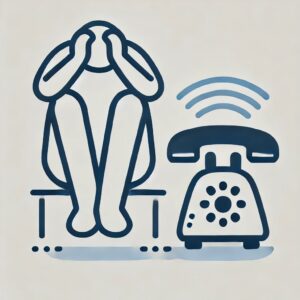Are You Dealing with Creditor Harassment?
If you’re dealing with debt, you may face creditors who relentlessly pursue you for payment. But what counts as creditor harassment?
Understanding creditor harassment can empower you to stand up for your rights and protect yourself. As a Memphis bankruptcy lawyer, I’ve seen how wildly aggressive creditors can be. But while debt collectors are allowed to contact you, they aren’t permitted to harass or intimidate you.
Here’s what you need to know about creditor harassment and how to recognize when they’ve crossed the line:
What Exactly Is Creditor Harassment?
Under the Fair Debt Collection Practices Act (FDCPA), debt collectors are legally required to follow specific rules.
Harassment refers to when a debt collector intimidates, annoys, or pressures you unfairly. Here are some key behaviors that could qualify as harassment:
1. Calling at Inconvenient Times
Debt collectors aren’t allowed to call you before 8am or after 9pm unless you agree to it. If they contact you during these hours without permission, it can be considered harassment.
2. Frequent and Repeated Calls
Next, the FDCPA prohibits repeated, continuous calls. That means you shouldn’t receive multiple calls per day from the same creditor. If the same debt collectors keep calling, over and over, just to pressure you into paying, they’re harassing you.
3. Threatening Language or Behavior
Debt collectors can’t use abusive, profane, or threatening language. This includes yelling, belittling, or intimidating you in any way. If a debt collector tries to scare you into making payments, they’re violating your rights.
 4. Contacting You at Work After You’ve Asked Them Not To
4. Contacting You at Work After You’ve Asked Them Not To
You have the right to tell debt collectors not to contact you at your workplace. And in fact, once you’ve made this request, they’re legally obligated to stop.
5. Misrepresenting Themselves or the Amount Owed
Debt collectors can’t lie about who they are, how much you owe, or any other detail related to your debt. They may try to pose as law enforcement, lawyers, or other officials to intimidate you—but these scare tactics are illegal.
6. Threatening to Take Unlawful Action
In addition, they also can’t threaten to arrest you, take your property, or garnish your wages if they don’t have the legal right to do so. Threatening any unlawful action is a common harassment tactic, and it’s prohibited.
7. Sharing Your Debt Information with Others
Discussing your debt with people who aren’t authorized, including your friends, family, or co-workers, is illegal. Debt collectors are only allowed to contact other people to find out your address, home phone number, and where you work.
8. Using Deceptive Practices
Some debt collectors may use trickery or deceit to scare you into paying. For example, they might send you letters that look like official court documents when they aren’t. These misleading practices are designed to intimidate and can be considered harassment.
 What Can You Do if You’re Experiencing Creditor Harassment?
What Can You Do if You’re Experiencing Creditor Harassment?
If you’re dealing with harassment, there are some steps you can take to protect yourself:
- First, document everything. Keep records of all communications, including the date, time, and nature of each call. You can use this documentation if you need to report the creditor.
- Ask debt collectors to communicate with you in writing rather than calling. This can help reduce the stress of frequent calls and gives you a paper trail.
- In addition, you can send a “cease-and-desist” letter. Legally, you have the right to request that debt collectors stop contacting you. Sending a formal cease and desist letter can force them to stop their calls and letters.
- Lastly, report any violations. If a debt collector is violating your rights, you can report them to the Consumer Financial Protection Bureau (CFPB), the Federal Trade Commission (FTC), or your state’s attorney general’s office.
 Get Our Free Report: What Counts as Creditor Harassment and How to Stop It
Get Our Free Report: What Counts as Creditor Harassment and How to Stop It
If you worry you’re being harassed over a debt, you need the right tools to make it stop.
To that end, our experienced Memphis bankruptcy attorneys have written a free report to help.
Creditors Can’t Do That outlines all of the rules included in the FDCPA. We provide a template for your cease-and-desist letter and a guide to reporting violations to the right authorities. And we give you all the details about other options to stop the harassment for good.
Get your free copy today.
Bankruptcy to Stop Creditor Harassment
If you have overwhelming debt and face creditor harassment, you may want to consider the benefits of bankruptcy.
Filing for bankruptcy puts something called an “automatic stay” in place. This court order legally requires creditors to stop all collection activities. As a result, this immediate relief will protect you from ongoing harassment.
In addition, bankruptcy has the power to stop foreclosure and repossession, clear your medical and credit card debt, and give you a fresh start.
And once you file, you can tell your creditors “talk to my attorney.” They aren’t your problem anymore.
Our attorneys are here to help. We offer a free consultation, where we discuss your situation and any concerns, no strings attached.
Contact us today to get started or call us at 901-327-2100.


 4. Contacting You at Work After You’ve Asked Them Not To
4. Contacting You at Work After You’ve Asked Them Not To What Can You Do if You’re Experiencing Creditor Harassment?
What Can You Do if You’re Experiencing Creditor Harassment? Get Our Free Report: What Counts as Creditor Harassment and How to Stop It
Get Our Free Report: What Counts as Creditor Harassment and How to Stop It